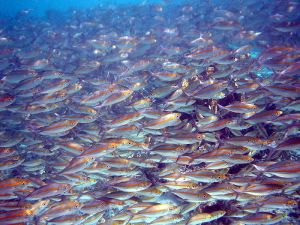21st November 2014.
Review
This seminar studied the anti-predation tactics employed by species of prey to defend themselves against predators. The primary example used for this session was the shoaling of schools of fish, this is an example of the dilution effect, this is a defence mechanism against olfactory predators as it allows the fish to appear as a single, much larger entity which may act as a deterrent to the predator.
It has also been recorded that fish use areas of sensory refuge to further deter olfactory predators, this includes positioning themselves within tidal currents and areas of turbulence which can make it harder for predators to find the exact location of the fish.

Predators often target oddities, fish that swim slower, are slightly bigger, slightly smaller, have smaller fins or are different colours have a greater chance of being more conspicuous to a predator, fish have been shown to swim with shoals of matched sizes to avoid becoming the oddity and more prone to being targeted. Predators however generally attack from the outside of a shoal to access the middle of the shoal, where there is a much greater probability of success.
The secondary example used for this session were frogs and how they have been shown to cluster together to form small groups, the clusters then move to limited domains of danger, increasing their distance from threats and predators to the greatest distance possible. This is known as the selfish heard as frogs do not interact as a group but instead use it to minimize their own chances of being predated upon.
Opinion
I found this lecture interesting as it was not something that I had ever considered and I found in interesting to learn more about the mechanics between predators and prey, particularly in such a densely populated environment as an aquatic one.
Career
Although it is not a field of study that I had ever considered for a future career, I did find it interesting and it would be something that I would be prepared to study further and then evaluate career options and my levels of interest as a later stage when I knew more about the subject area and the career opportunities available.
